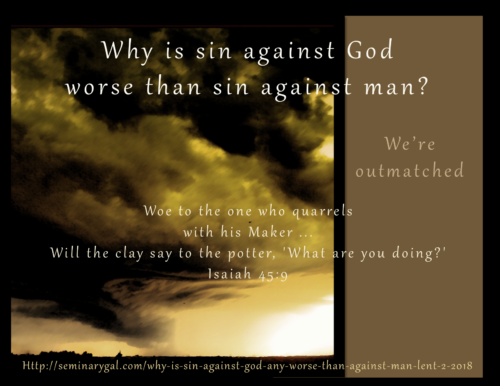Why Is Sin Against God Any Worse Than Against Man? (Lent 2-2018)
Repentance, it’s one of those words. Christian jargon that only religious people actually use or try to understand fully. It’s one of those actions Christians don’t practice as they should. It’s a change of heart, a change of direction, and a change of behavior. It’s making up one’s mind to agree with God about sin and determining to live in agreement with Him. Genuine repentance isn’t easy.
It gets at the heart of why yesterday’s “I’m sorry” really isn’t good enough. Genuine guilt leaves a stain. Jeremiah 2:22 “Although you wash yourself with soda and use an abundance of soap, the stain of your guilt is still before me,” declares the Sovereign LORD.” Yeah, He’s Sovereign and we’re outmatched.
As we continue Pi and Chi our Lent 2018 devotional series of 40 hard questions, Pi (from the Life of Pi) is talking with a writer who is interviewing him about his life story. As a Hindu, Pi quips,
We get to feel guilty before hundreds of gods instead of just one.“
But is it a matter of numbers? Would guilt before a thousand men ever measure up to guilt before One True God? Is our guilt real, determined by Someone beyond us or does it just come from a tiny voice we can ignore?
What determines guilt anyway?
Is it the right of a Sovereign God, or is it just a feeling?

Why Is Sin Against God Any Worse Than Against Man?
Getting at why any apology from Adam and Eve would have proved insufficient, let’s just acknowledge the issue of consequences. Apologies don’t take them away. After all, who are we to quarrel with our Maker?
God said, “Don’t eat” from the tree of the knowledge of good and evil because He loved us. He outlined the consequences of disobedience to His command—a forewarning grounded in His love for His Image-bearers. Yet Adam and Eve persisting in that state of consequences is what the tree of life represented and explains why God, in love, had to banish them. Actions have consequences. Actions against an eternal Being have eternal consequences which a finite human can never wash clean.
Think about it:
- Dissing your Creator and dissing your fellow man are two different things. Read Isaiah 45:5-12. What sin is at the heart of dissing your Creator who has existed from eternity past?
- Why did God’s command and the consequences pronounced to Adam become irrevocable? What would happen to God’s character if He’d just said, “OK, this time I’ll spare you from your choices. After all, you said you’re sorry. But next time, I mean it.”?
- Why was Jesus’ sacrifice—taking God’s wrath upon Himself—both acceptable and eternal?
- Is there a difference between punishment and natural consequences?
- Can natural consequences be forgiven enough so they won’t happen? Or do you reap what you sow? Galatians 6:7
Join me tomorrow for “Why Can’t Words Undo Actions?”
===
For Lent 2018, we’ll explore the questions of Pi and Chi (the Greek letter beginning the word Christos, which means Christ, Messiah, the Anointed One). We’ll ask and answer the question “Why?” as we discover the uniqueness of Jesus Christ. Join me for the 40 days of Lent which began February 14, 2018 by liking Seminary Gal on Facebook or having these devotionals sent to your email box which you can do via the sign-up on my Home page. Thank you for blessing me with this opportunity to study together the Word of God.
===
Acknowledging that former years’ devotional series remain popular:
- Lent 2013 looked at The Letter to the Romans: Paul’s Masterpiece to reclaim foundations of our Christian heritage and began February 13, 2013.
- A very special and ever popular offering was Lent 2014’s Be Still and Know that I AM God which can be obtained through the archives beginning in March 2014.
- Lent 2015 began on February 18, 2015 with a series entitled With Christ in the Upper Room: Final Preparations. We explored what is often called “The Upper Room Discourse” found in John chapters 13-17.
- ReKindle, the Lent 2016 series, began on February 10, 2016 and encouraged us to rekindle our spiritual lives.
- Light: There’s Nothing Like It was the 2017 Lent series and explored this metaphor often used to portray Christ. It is archived beginning March 1, 2017.


Leave a Reply